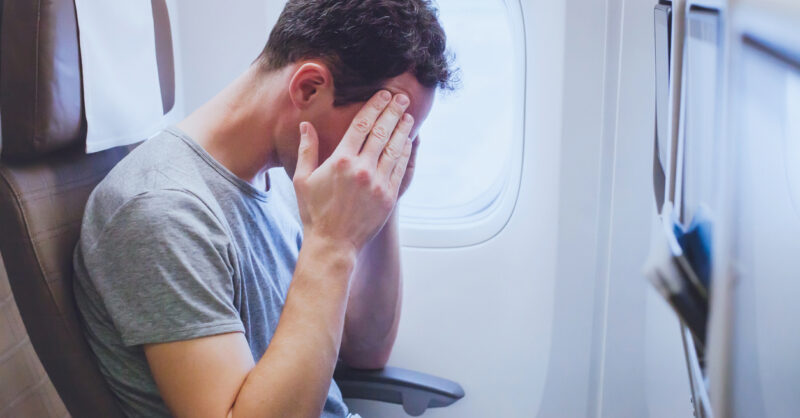Tips for Getting Over Jet Lag

The excitement of landing in a new place (or the relief of returning home from a trip) sometimes can't make up for the struggle of getting over jet lag when traveling long distances. The tiredness, lack of energy, or just weird feeling you feel after crossing several time zones can stop you from enjoying yourself for a few days until your body gets used to the new time zone.
There's nothing worse than when everyone else in the time zone is ready to go, but you need a nap! Fortunately, jet lag doesn't have to stop you in your tracks (or keep you awake all night when you need to sleep). Follow these easy tips before and during your trip to keep your energy up at the right time, and keep your phone charged and ready to go with MobileQubes!
What To Do Before You Travel To Minimize Jet Lag
Believe it or not, you can take steps to make jet lag less severe before you even pack for your trip! The first step is knowing how many time zones you are crossing to give you an idea of when you will go to sleep and wake up versus what time your body will think it is. Try using an online time zone calculator to figure this out.
Once you know how big of a time change you are making, another great idea is changing your bedtime. If possible, try going to bed an hour earlier or later than usual, or getting up an hour earlier or later, depending on the direction you are traveling. This change will bring your natural sleep rhythms closer into alignment with your destination time zone. Your body will thank you when you feel more rested upon arrival.
Go Easy on Your Stomach
Jet lag can make you sleepy during the day or wide awake at night, but did you know that you can also feel jet lag's effects on your digestive system? In addition to altering your sleep habits, changing your eating habits before and during travel can also make jet lag less problematic. For example, keeping your meals smaller before your trip may help you avoid an upset stomach. If you already know that certain foods tend to make you feel unwell, you'll want to skip those, too, since your digestive system will already have to deal with the impact of jet lag.
Focus on Light When Getting Over Jet Lag
Light exposure plays a significant role in your experience of jet lag, thanks to its role in your regular sleep pattern. Have you ever noticed at home on a typical day that when you don't use an alarm, you tend to wake up at about the same time of the morning or that you usually start to feel tired around the same time every evening? This is because your body's circadian rhythm uses light to know when to wake up and when to fall asleep. Over time your body becomes accustomed to this rhythm, and traveling several time zones away will throw it off for a while until your body gets used to the new time zone.
What can you do to help your body adjust? It depends on the direction you are traveling. When you travel west, night falls later, so make it a priority to see some natural light in the evening. On the flip side, when you travel east, morning seems earlier, so make sure you get some sunshine early in the morning.
However, keep in mind that when you travel more than eight time zones in either direction, your body may have trouble telling whether the light signifies morning or evening. In that case, you should reverse the advice above; avoid early morning sunshine if you traveled east and avoid evening light exposure if you traveled west.
Don’t Get Dehydrated When Dealing With Jet Lag
Like most things in life, jet lag feels worse when you are dehydrated. Make sure to drink plenty of water throughout your trip, and if you are flying to your destination, don't forget that the dry air on an airplane can contribute to your dehydration. Your water bottle is your friend.
Strategic Caffeine Usage Can Help with Getting Over Jet Lag
Caffeine has a wonderful ability to stimulate wakefulness, but only when used correctly. If you overuse caffeine throughout the day, you may have difficulty sleeping at the right time in your new time zone. However, a cup of coffee in the morning may help your body realize that it is time to wake up, and avoiding caffeine in the afternoon and evening can allow your body to calm down to prepare for a good night's sleep.
Exercise Can Make You Feel Better
Exercise has many documented benefits for the body. Recent research suggests that consistently exercising every day can also help your body adjust to a very different time zone. However, this means you would need to start exercising to establish a routine before your trip so that your body gets used to the exercise time each day. If you're not currently living an active lifestyle, get started on an exercise routine now. Regardless of whether this helps with getting over jet lag on your upcoming trip, your health will improve if you start working out regularly.
No gym at your destination? Try using an exercise app on your phone to keep you moving or a fitness tracker for an accountability check on your regular workout routine. Remember that going for a walk or run is almost always an option.
Consider Taking Melatonin
Taking melatonin may help your body realize that it is time to sleep. According to Mayo Clinic, "The latest research seems to show that melatonin aids sleep during times when you wouldn't normally be resting, making it beneficial for people with jet lag." Even a small dose of melatonin may be effective, but you should avoid alcohol when taking melatonin, and it's important to remember that side effects are possible. As always, consult a medical professional to determine if taking melatonin to help with jet lag is appropriate and healthy for you.
Don’t Overdo It With Naps
Even if you follow all of the tips above, jet lag can give you an overwhelming feeling of tiredness at completely the wrong time. You might find that your body is begging for a nap in the middle of the day. Listen to your body, and don't worry if this happens while you're getting over jet lag. You don't have to deny yourself completely! Just take care to limit your napping time to 15-20 minute periods so you will still feel tired enough to go to sleep at night.
Make Sure Your Phone Has the Same Energy You Do With MobileQubes
When you travel, don't let your phone get jet lag and take a nap at the wrong time! Give it the juice it needs whenever you land with MobileQubes. Whether you're listening to an audiobook or posting photos on Instagram, your phone has a lot to do throughout your trip. Plan ahead to get the charge your phone needs.
Try MobileQubes' convenient locations where you can rent or buy a Qube to charge any mobile device. Check out our website's Find a Qube feature today!
